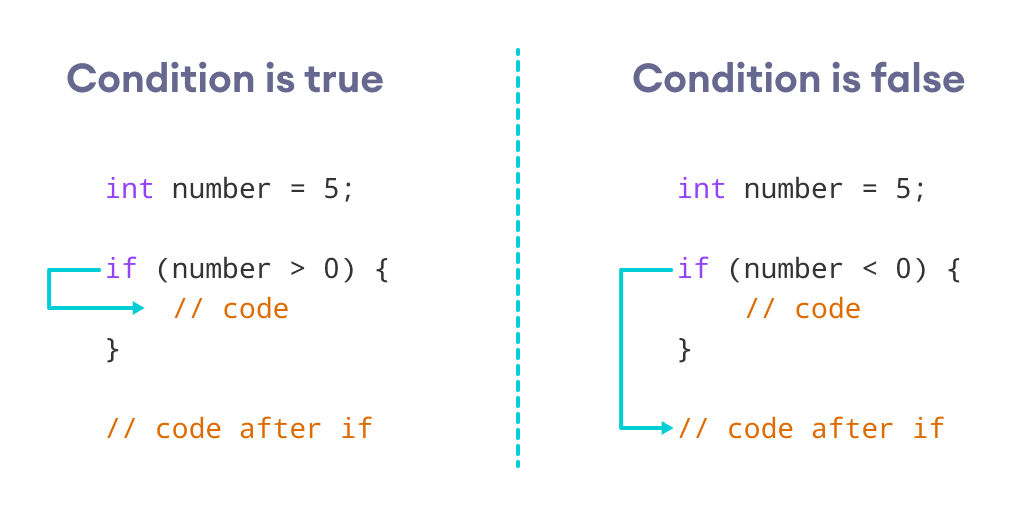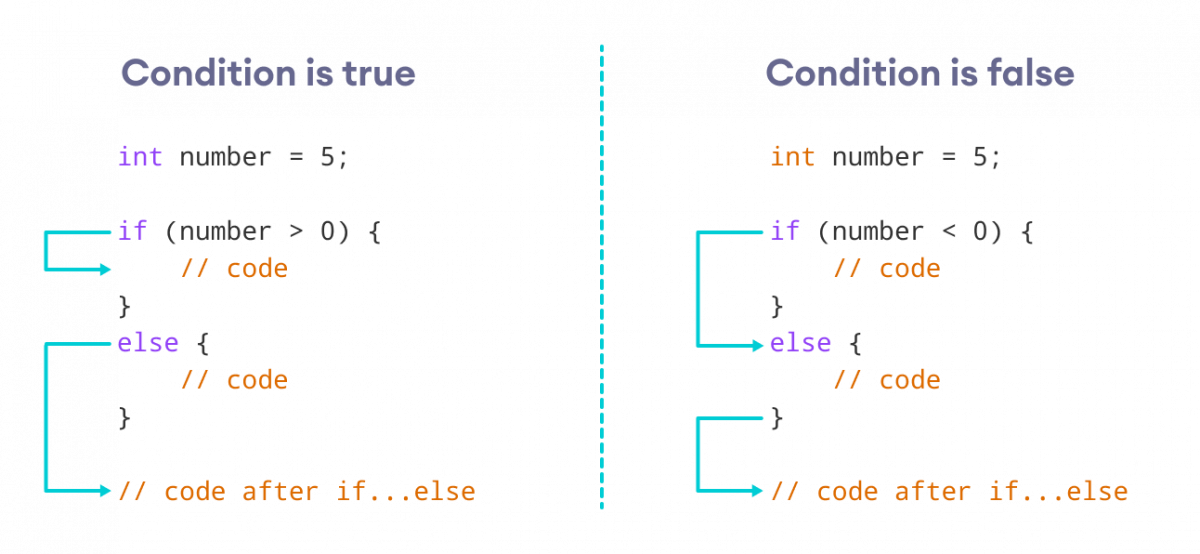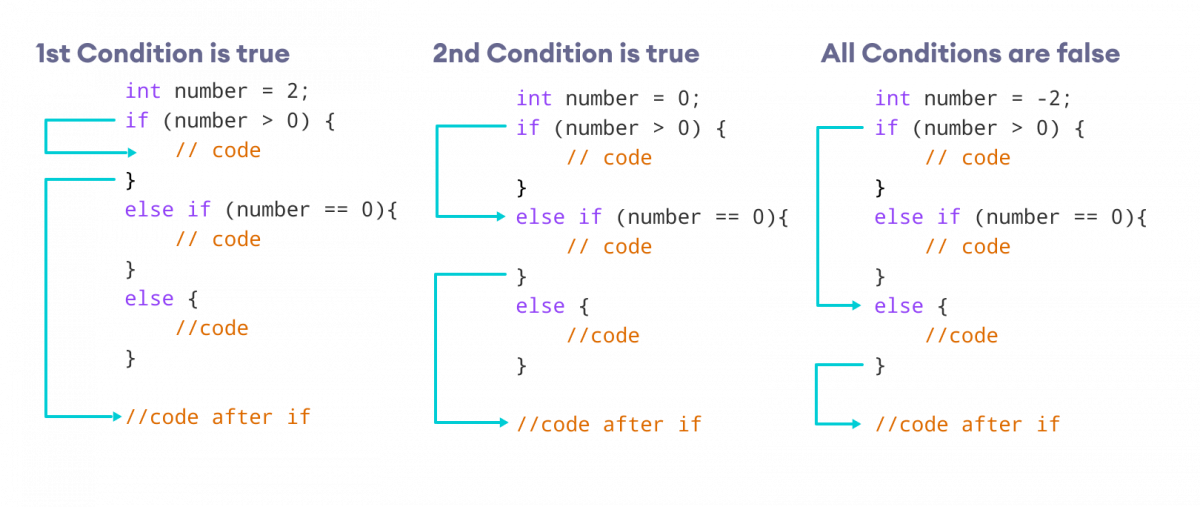- C#if,if … else,if … else if和嵌套if语句(1)
- C#if,if … else,if … else if和嵌套if语句
- Java if,if … else语句
- Java if,if … else语句(1)
- C if … else语句
- C if … else语句(1)
- Swift if,if … else语句(1)
- Swift if,if … else语句
- Python if … else语句
- Python if … else语句(1)
- JavaScript if … else语句(1)
- JavaScript if … else语句
- JavaScript-if … else语句
- JavaScript-if … else语句(1)
- 斯卡拉 |决策(if、if-else、嵌套 if-else、if-else if)(1)
- 斯卡拉 |决策(if、if-else、嵌套 if-else、if-else if)
- C C++中的决策(if,if..else,嵌套的if,if-else-if)(1)
- C / C++中的决策(if,if..else,嵌套的if,if-else-if)
- c# if else (1)
- c++ if else - C++ (1)
- c# if else - C# (1)
- if else c#(1)
- C# if-else(1)
- C++ if-else
- C++ 中的 if else(1)
- C# if-else
- C++ if-else(1)
- if else c++ (1)
- R 编程中的决策——if、if-else、if-else-if 阶梯、嵌套 if-else 和 switch
📅 最后修改于: 2020-09-25 04:57:06 🧑 作者: Mango
在本教程中,我们将学习if … else语句,以借助示例来创建决策程序。
在计算机编程中,仅当满足特定条件时,才使用if语句运行块代码。
例如,根据学生获得的分数分配成绩(A,B,C)。
C++中if...else语句有三种形式。
C++ if语句
if语句的语法为:
if (condition) {
// body of if statement
} if语句评估括号( )的condition 。
注意: { }的代码是if语句的主体。

示例1:C++ if语句
// Program to print positive number entered by the user
// If the user enters a negative number, it is skipped
#include
using namespace std;
int main() {
int number;
cout << "Enter an integer: ";
cin >> number;
// checks if the number is positive
if (number > 0) {
cout << "You entered a positive integer: " << number << endl;
}
cout << "This statement is always executed.";
return 0;
} 输出1
Enter an integer: 5
You entered a positive number: 5
This statement is always executed.当用户输入5 ,条件number > 0被评估为true并执行if体内的语句。
输出2
Enter a number: -5
This statement is always executed.当用户输入-5 ,条件number > 0被评估为false并且if主体内部的语句将不会执行。
C++如果...否则
if语句可以具有可选的else子句。其语法为:
if (condition) {
// block of code if condition is true
}
else {
// block of code if condition is false
} if..else语句评估括号内的condition 。

如果condition评估为true ,
如果condition评估为false ,
示例2:C++ if ... else语句
// Program to check whether an integer is positive or negative
// This program considers 0 as a positive number
#include
using namespace std;
int main() {
int number;
cout << "Enter an integer: ";
cin >> number;
if (number >= 0) {
cout << "You entered a positive integer: " << number << endl;
}
else {
cout << "You entered a negative integer: " << number << endl;
}
cout << "This line is always printed.";
return 0;
} 输出1
Enter an integer: 4
You entered a positive integer: 4.
This line is always printed.在上面的程序中,条件number >= 0 。如果我们输入大于或等于0 ,则条件评估为true 。
在这里,我们输入4 。因此,条件为true 。因此,将执行if体内的语句。
输出2
Enter an integer: -4
You entered a negative integer: -4.
This line is always printed.在这里,我们输入-4 。因此,条件为false 。因此,将执行else主体内部的语句。
C++ if ... else ... else if语句
if...else语句用于在两个替代方案之间执行代码块。但是,如果需要在两个以上的选择之间进行选择,则可以使用if...else if...else语句。
if...else if...else语句的语法为:
if (condition1) {
// code block 1
}
else if (condition2){
// code block 2
}
else {
// code block 3
}这里,

注意: else if语句可以有多个,而if和else语句只能是一个。
示例3:C++ if ... else ... else if
// Program to check whether an integer is positive, negative or zero
#include
using namespace std;
int main() {
int number;
cout << "Enter an integer: ";
cin >> number;
if (number > 0) {
cout << "You entered a positive integer: " << number << endl;
}
else if (number < 0) {
cout << "You entered a negative integer: " << number << endl;
}
else {
cout << "You entered 0." << endl;
}
cout << "This line is always printed.";
return 0;
} 输出1
Enter an integer: 1
You entered a positive integer: 1.
This line is always printed.输出2
Enter an integer: -2
You entered a negative integer: -2.
This line is always printed.输出3
Enter an integer: 0
You entered 0.
This line is always printed.在此程序中,我们从用户那里获取一个号码。然后,我们使用if...else if...else阶梯检查数字是否为正,负或零。
如果数字大于0 ,则执行if块内的代码。如果该数字小于0 ,则执行else if块中的代码。否则,将执行else块中的代码。
C++如果...则嵌套
有时候,我们需要使用if其他内声明if声明。这称为嵌套if语句。
将其视为if语句的多层。有第一个外部if语句,在内部还有另一个if语句。其语法为:
// outer if statement
if (condition1) {
// statements
// inner if statement
if (condition2) {
// statements
}
}笔记:
- 我们可以根据需要在内部
if语句中添加else和else if语句。 - 内部
if语句也可以插入外部else或else if语句(如果存在)中。 - 我们可以嵌套多层
if语句。
示例4:C++如果嵌套
// C++ program to find if an integer is even or odd or neither (0)
// using nested if statements
#include
using namespace std;
int main() {
int num;
cout << "Enter an integer: ";
cin >> num;
// outer if condition
if (num != 0) {
// inner if condition
if ((num % 2) == 0) {
cout << "The number is even." << endl;
}
// inner else condition
else {
cout << "The number is odd." << endl;
}
}
// outer else condition
else {
cout << "The number is 0 and it is neither even nor odd." << endl;
}
cout << "This line is always printed." << endl;
} 输出1
Enter an integer: 34
The number is even.
This line is always printed.输出2
Enter an integer: 35
The number is odd.
This line is always printed.输出3
Enter an integer: 0
The number is 0 and it is neither even nor odd.
This line is always printed.在上面的示例中,
注意0也可以被2整除,但实际上不是偶数。这就是为什么我们首先要在外部if条件中确保输入数字不为0的原因。
注意:如您所见,嵌套if...else使您的逻辑变得复杂。如果可能,您应该始终尝试避免嵌套if...else 。
if ... else的主体,只有一个语句
如果if...else的主体只有一个语句,则可以在程序中省略{ } 。例如,您可以替换
int number = 5;
if (number > 0) {
cout << "The number is positive." << endl;
}
else {
cout << "The number is negative." << endl;
}与
int number = 5;
if (number > 0)
cout << "The number is positive." << endl;
else
cout << "The number is negative." << endl;两个程序的输出将相同。
注意:如果if...else的主体只有一个语句,则不必使用{ } ,但是使用{ }可使代码更具可读性。
有关决策的更多信息
在某些情况下, 三元运算符可以替换if...else语句。要了解更多信息,请访问C++三元运算符。
如果我们需要根据给定的测试条件在多个备选方案之间做出选择,则可以使用switch语句。要了解更多信息,请访问C++开关。
查看以下示例以了解更多信息:
C++程序检查数字是偶数还是奇数
用于检查字符是元音还是辅音的C++程序。
C++程序查找三个数字中最大的数字